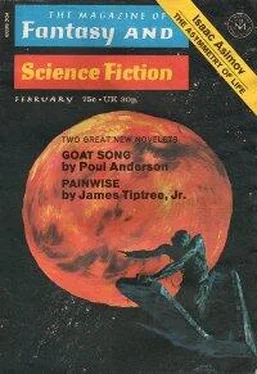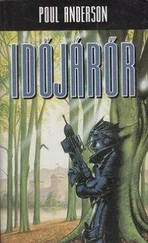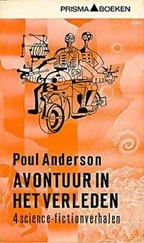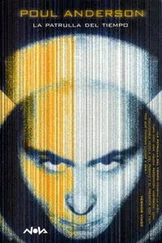Poul Anderson - Goat Song
Здесь есть возможность читать онлайн «Poul Anderson - Goat Song» весь текст электронной книги совершенно бесплатно (целиком полную версию без сокращений). В некоторых случаях можно слушать аудио, скачать через торрент в формате fb2 и присутствует краткое содержание. Год выпуска: 1972, Издательство: Mercury Press, Inc., Жанр: Фантастика и фэнтези, на английском языке. Описание произведения, (предисловие) а так же отзывы посетителей доступны на портале библиотеки ЛибКат.
- Название:Goat Song
- Автор:
- Издательство:Mercury Press, Inc.
- Жанр:
- Год:1972
- ISBN:нет данных
- Рейтинг книги:3 / 5. Голосов: 1
-
Избранное:Добавить в избранное
- Отзывы:
-
Ваша оценка:
- 60
- 1
- 2
- 3
- 4
- 5
Goat Song: краткое содержание, описание и аннотация
Предлагаем к чтению аннотацию, описание, краткое содержание или предисловие (зависит от того, что написал сам автор книги «Goat Song»). Если вы не нашли необходимую информацию о книге — напишите в комментариях, мы постараемся отыскать её.
Goat Song — читать онлайн бесплатно полную книгу (весь текст) целиком
Ниже представлен текст книги, разбитый по страницам. Система сохранения места последней прочитанной страницы, позволяет с удобством читать онлайн бесплатно книгу «Goat Song», без необходимости каждый раз заново искать на чём Вы остановились. Поставьте закладку, и сможете в любой момент перейти на страницу, на которой закончили чтение.
Интервал:
Закладка:
“You are unbelievably insolent,” She says without force.
“No, Lady, just desperate,” I say.
The ghost of a smile touches Her lips. She leans back, eyes hooded, and murmurs, “Well, I’ll take you there. What happens then, you realize, lies outside My power. My observations, My recommendations, are nothing but a few items to take into account, among billions. However… we have a long way to travel this night. Give me what data you think will help you, Harper.”
I do not finish the Lament. Nor do I dwell in any other fashion on grief. Instead, as the hours pass, I call upon those who dealt with the joy (not the fun, not the short delirium, but the joy) that man and woman might once have of each other.
Knowing where we are bound, I too need such comfort.
And the night deepens, and the leagues fall behind us, and finally we are beyond habitation, beyond wildcountry, in the land where life never comes. By crooked moon and waning starlight I see the plain of concrete and iron, the missiles and energy projectors crouched hike beasts, the robot aircraft wheeling aloft: and the lines, the relay towers, the scuttling beetle-shaped carriers, that whole transcendent nerve-blood-sinew by which SUM knows and orders the world. For all the flitting about, for all the forces which seethe, here is altogether still. The wind itself seems to have frozen to death. Hoarfrost is gray on the steel shapes. Ahead of us, tiered and mountainous, begins to appear the castle of SUM.
She Who rides with me does not give sign of noticing that my songs have died in my throat. What humanness She showed is departing; Her face is cold and shut, Her voice bears a ring of metal. She hooks straight ahead. But She does speak to me for a little while yet:
“Do you understand what is going to happen? For the next half year I will be linked with SUM, integral, another component of It. I suppose you will see Me, hut that will merely be My flesh. What speaks to you will be SUM.”
“I know.” The words must be forced forth. My coming this far is more triumph than any man in creation before me has won; and I am here to do battle for my Dancer-on-Moonglades; but nonetheless my heart shakes me, and is loud in my skull, and my sweat stinks.
I manage, though, to add: “You will be a part of It, Lady of Ours. That gives me hope.”
For an instant She turns to me, and lays Her hand across mine, and something makes Her again so young and ushaken that I almost forget the girl who died; and she whispers, “If you knew how I hope!”
The instant is gone, and I am alone among machines.
We must stop before the castle gate. The wall looms sheer above, so high and high that it seems to be toppling upon me against the westward march of the stars, so black and black that it does not only drink down every light, it radiates blindness. Challenge and response quiver on electronic bands I cannot sense. The outer-guardian parts of It have perceived a mortal aboard this craft. A missile launcher swings about to aim its three serpents at me. But the Dark Queen answers—She does not trouble to be peremptory—and the castle opens its jaws for us.
We descend. Once, I think, we cross a river. I hear a rushing and hollow echoing and see droplets glitter where they are cast onto the viewports and outlined against dark. They vanish at once: liquid hydrogen, perhaps, to keep certain parts near absolute zero?
Much hater we stop and the canopy slides back. I rise with Her. We are in a room, or cavern, of which I can see nothing, for there is no light except a dull bluish phosphorescence which streams from every solid object, also from Her flesh and mine. But I judge the chamber is enormous, for a sound of great machines at work comes very remotely, as if heard through dream, while our own voices are swallowed up by distance. Air is pumped through, neither warm nor cold, totally without odor, a dead wind.
We descend to the floor. She stands before me, hands crossed on breast, eyes half shut beneath the cowl and not looking at me nor away from me. “Do what you are told, Harper,” She says in a voice that has never an overtone, “precisely as you are told.” She turns and departs at an even pace. I watch Her go until I can no longer tell Her luminosity from the formless swirlings within my own eyeballs.
A claw plucks my tunic. I hook down and am surprised to see that time dwarf robot has been waiting for me this whole time. How long a time that was, I cannot tell.
Its squat form leads me in another direction. Weariness crawls upward through mime, my feet stumble, my lips tingle, lids are weighted and muscles have each their separate aches. Now and then I feel a jag of fear, but dully. When the robot indicates Lie down here, I am grateful.
The box fits me well. I let various wires be attached to me, various needles be injected which lead into tubes. I pay little attention to the machines which cluster amid murmur around me. The robot goes away. I sink into blessed darkness.
I wake renewed in body. A kind of shell seems to have grown between my forebrain and the old animal parts. Far away I can feel the horror and hear the screaming and thrashing of my instincts; but awareness is chill, calm, logical. I have also a feeling that I slept for weeks, months, while leaves blew loose and snow fell on the upper world. But this may be wrong, and in no case does it matter. I am about to be judged by SUM.
The little faceless robot leads me off, through murmurous black corridors where the dead wind blows. I unsling my harp and clutch it to me, my sole friend and weapon. So the tranquility of the reasoning mind which has been decreed for me cannot be absolute. I decide that It simply does not want to be bothered by anguish. (No; wrong; nothing so humanhike; It has no desires; beneath that power to reason is nullity.)
At length a wall opens for us and we enter a room where She sits enthroned. The self-radiation of metal and flesh is not apparent here, for light is provided, a featureless white radiance with no apparent source. White, too, is the muted sound of the machines which encompass Her throne. White are Her robe and face. I look away from the multitudinous unwinking scanner eyes, into Hers, but She does not appear to recognize me. Does She even see me? SUM has reached out with invisible fingers of electromagnetic induction and taken Her back into Itself. I do not tremble or sweat—I cannot—but I square my shoulders, strike one plangent chord, and wait for It to speak.
It does, from sonic invisible place. I recognize the voice It has chosen to use: my own. The overtones, the inflections are true, normal, what I myself would use in talking as one reasonable man to another. Why not? In computing what to do about me, and in programming Itself accordingly, SUM must have used so many billion bits of information that adequate accent is a negligible subproblem.
No… there I am mistaken again… SUM does not do things on the basis that It might as well do them as not. This talk with myself is intended to have some effect on me. I do not know what.
“Well,” It says pleasantly, “you made quite a journey, didn’t you? I’m glad. Welcome.”
My instincts bare teeth to hear those words of humanity used by the unfeeling unalive. My logical mind considers replying with an ironic “Thank you,” decides against it, and holds me silent.
“You see,” SUM continues after a moment that whirrs, “you are unique. Pardon Me if I speak a little bluntly. Your sexual monomania is just one aspect of a generally atavistic, superstition-oriented personality. And yet, unlike the ordinary misfit, you’re both strong and realistic enough to cope with the world. This chance to meet you, to analyze you while you rested, has opened new insights for Me on human psychophysiology. Which may head to improved techniques for governing it and its evolution.”
Читать дальшеИнтервал:
Закладка:
Похожие книги на «Goat Song»
Представляем Вашему вниманию похожие книги на «Goat Song» списком для выбора. Мы отобрали схожую по названию и смыслу литературу в надежде предоставить читателям больше вариантов отыскать новые, интересные, ещё непрочитанные произведения.
Обсуждение, отзывы о книге «Goat Song» и просто собственные мнения читателей. Оставьте ваши комментарии, напишите, что Вы думаете о произведении, его смысле или главных героях. Укажите что конкретно понравилось, а что нет, и почему Вы так считаете.











